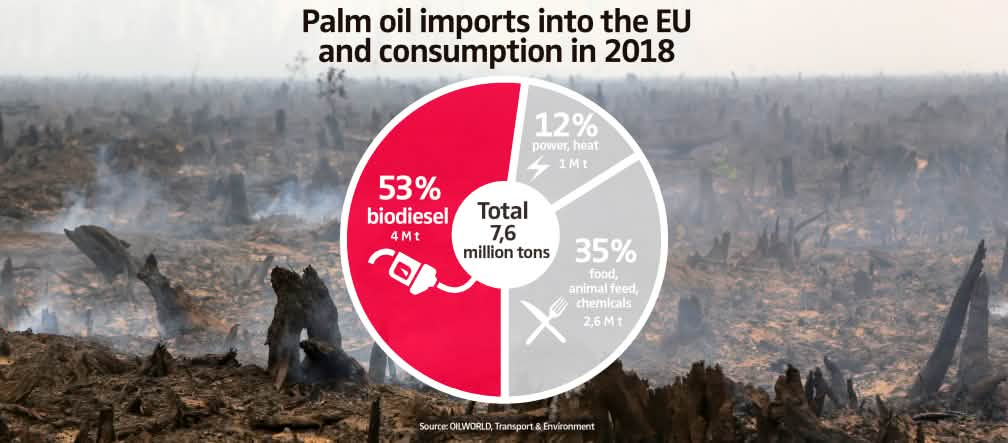
Completed campaign
Stop palm oil and soy biofuels NOW!
An increasing share of Europe's palm and soy oil imports is literally going up in smoke, and tropical forests are being trashed to meet the demand for supposedly “green” fuels. The EU is phasing out palm oil, but not until 2030 – far too late. Tell the EU member states to act NOW: palm and soybean oils do not belong in fuel tanks!
To: the governments of the EU member states
“The EU member states must act NOW: stop adding palm and soy oils to diesel fuel!”There are many ways in which motor vehicles are terrible for the environment and human health – and the EU’s badly flawed climate policy is making matters worse.
The share of Europe's palm and soy oil imports being added to diesel fuel is on the increase. In 2018, the EU countries imported 4 million tons of crude palm oil and 3.5 million tons of refined palm and soy oil diesel from Southeast Asia and South America. The imports have an estimated value of 4.2 billion euros.
Most of the tropical vegetable oil imported into Europe is being used as fuel due to the EU's fatally flawed climate policy. As a result, orangutans and many other endangered species are losing their habitat and going extinct because of demand for supposedly “green” biofuels.
Deforestation in the tropics for the cultivation of oil palms and soy releases vast amounts of carbon. According to a study recently commissioned by the EU, biofuel produced from palm oil has three times the carbon footprint of fossil diesel, while burning soy diesel releases twice the carbon of fossil diesel. Biofuels are thus anything but “green”.
These issues have been known for a long time, but the EU is responding too slowly and hesitantly. In early 2019, the EU labeled palm oil as unsustainable and decided to phase it out between 2023 and 2030. Soy oil is not affected by this decision.
But there is hope: Individual EU member states have the option of completely phasing out biofuels based on food crops such as oil palms and soybeans as early as 2021.
We therefore call on the individual member states to end the use of biofuels as soon as possible. Palm and soy oils do not belong in diesel fuel!
The EU has been promoting the use of biofuels since 2009 with its Renewable Energy Directive (RED). According to RED, the share of energy from renewable sources must account for at least 10% of final energy consumption in all member states in all modes of transportation across the transportation sector in 2020.
Adding biodiesel to fossil fuel is one of the cheapest solutions for oil companies. The blending ratio is seven percent. In Germany, for example, palm oil accounts for a quarter of biodiesel.
Two thirds of the palm oil imported into the EU is now used for energy, while other sectors such as the food, animal feed and chemical industries consume less and less palm oil, accounting for one-third of the total (down 11% from 2017).
EU palm oil imports and consumption in 2018:
- 53% (4 million tons) for biodiesel
- 12% (1 million tons) for power generation and heating
- 35% (2.6 million tons) for food, animal feed and chemicals
Total import: 7.6 million tons
In addition, more and more refined biodiesel from palm and soy oil is being imported into the EU from Southeast Asia and South America – a total of 3.5 million tons in 2018. Palm oil diesel accounted for 1.2 million tons and soy oil diesel for 2.3 million tons.
Imports of crude palm and soy oil for energy purposes and of refined biodiesel were valued at 4.2 billion euros in 2018 – a vast sum that is driving further deforestation in Southeast Asia and South America.
Sources: Transport & Environment and Oilworld
A reduction or complete phase-out of biofuels produced from food crops such as palm and soy oil at the national level by the governments of the member states is regulated in Art. 26 of the amended EU Renewable Energy Directive:
Article 26
Specific rules for biofuels, bioliquids and biomass fuels produced from food and feed crops
1. For the calculation of a Member State's gross final consumption of energy from renewable sources referred to in Article 7 and the minimum share referred to in the first subparagraph of Article 25(1), the share of biofuels and bioliquids, as well as of biomass fuels consumed in transport, where produced from food and feed crops, shall be no more than one percentage point higher than the share of such fuels in the final consumption of energy in the road and rail transport sectors in 2020 in that Member State, with a maximum of 7% of final consumption of energy in the road and rail transport sectors in that Member State.
Where that share is below 1% in a Member State, it may be increased to a maximum of 2% of the final consumption of energy in the road and rail transport sectors.
Member States may set a lower limit and may distinguish, for the purposes of Article 29(1), between different biofuels, bioliquids and biomass fuels produced from food and feed crops, taking into account best available evidence on indirect land-use change impact. Member States may, for example, set a lower limit for the share of biofuels, bioliquids and biomass fuels produced from oil crops.
Where the share of biofuels and bioliquids, as well as of biomass fuels consumed in transport, produced from food and feed crops in a Member State is limited to a share lower than 7% or a Member State decides to limit the share further, that Member State may reduce the minimum share referred to in the first subparagraph of Article 25(1) accordingly, by a maximum of 7 percentage points.
2. For the calculation of a Member State's gross final consumption of energy from renewable sources referred to in Article 7 and the minimum share referred to in the first subparagraph of Article 25(1), the share of high indirect land- use change-risk biofuels, bioliquids or biomass fuels produced from food and feed crops for which a significant expansion of the production area into land with high-carbon stock is observed shall not exceed the level of consumption of such fuels in that Member State in 2019, unless they are certified to be low indirect land-use change- risk biofuels, bioliquids or biomass fuels pursuant to this paragraph.
From 31 December 2023 until 31 December 2030 at the latest, that limit shall gradually decrease to 0%.
By 1 February 2019, the Commission shall submit to the European Parliament and to the Council a report on the status of worldwide production expansion of the relevant food and feed crops.
By 1 February 2019, the Commission shall adopt a delegated act in accordance with Article 35 to supplement this Directive by setting out the criteria for certification of low indirect land-use change-risk biofuels, bioliquids and biomass fuels and for determining the high indirect land-use change-risk feedstock for which a significant expansion of the production area into land with high-carbon stock is observed. The report and the accompanying delegated act shall be based on the best available scientific data.
By 1 September 2023, the Commission shall review the criteria laid down in the delegated act referred to in the fourth subparagraph based on the best available scientific data and shall adopt delegated acts in accordance with Article 35 to amend such criteria, where appropriate, and to include a trajectory to gradually decrease the contribution to the Union target set in Article 3(1) and to the minimum share referred to in the first subparagraph of Article 25(1), of high indirect land-use change-risk biofuels, bioliquids and biomass fuels produced from feedstock for which a significant expansion of the production into land with high-carbon stock is observed.
To: the governments of the EU member states
Ladies and Gentlemen,
An increasing share of European palm and soy oil imports is being used for energy, in particular biodiesel.
The cultivation of oil palms and soy is a major driver of rainforest destruction and loss of biodiversity. Biodiesel is not a “green” fuel – according to a study commissioned by the EU, its carbon footprint is up to three times larger than that of fossil diesel.
We call on you to initiate an immediate national phase-out of palm and soy oil in fuel.
Palm and soy oil do not belong in diesel fuel!
Yours faithfully,

